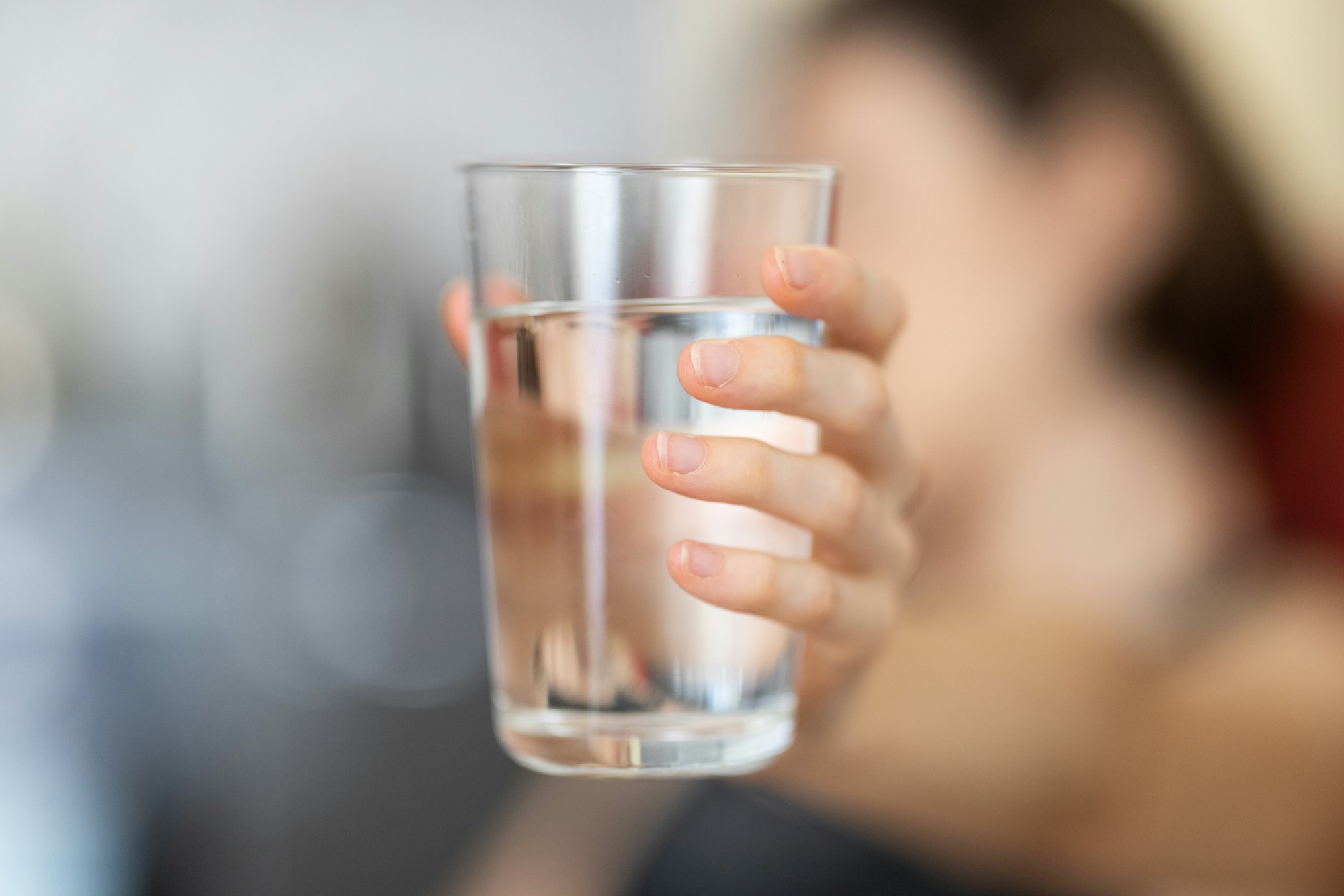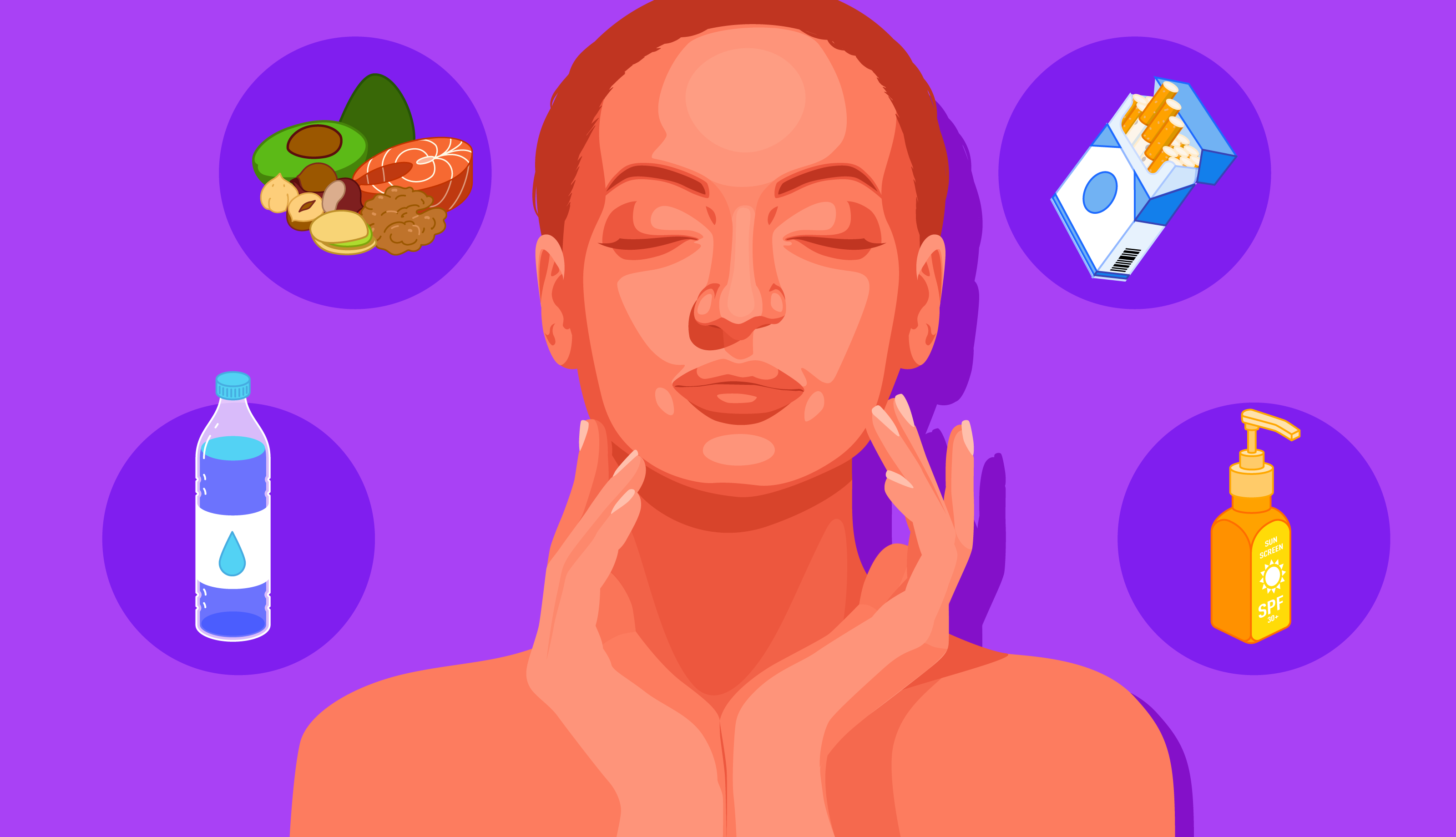Better skin health is on a lot of peoples wish lists, and whilst genetics and hormones play a significant role, there are dietary and lifestyle changes you can make to support your skin health and complexion. The good news is that many of these changes also benefit your overall wellbeing, improving heart health, immunity, microbiome diversity and more!
Table of contents:
- Food allergies
- Loving your skin from the inside out: diet & skin health
- Lifestyle changes to support skin health
- Takeaway
It is important to note that whilst diet and lifestyle play an important role in skin health, it is not the sole cause. In reality, many skin health issues result from a complex interplay of factors. For example, both acne and eczema have genetic and hormonal causes also.
Ultimately, the most effective skincare treatments will take a holistic approach, factoring in diet and lifestyle as a piece of the puzzle, though not at the expense of other elements.
Food allergies
Whilst it is true that allergies can influence skin health, their role is often overemphasised. In particular, many exclude gluten from their diet, assuming it is responsible for inflammatory skin diseases like psoriasis and eczema. In reality, unless you suffer from coeliac disease or hypersensitivity, gluten has no inherent inflammatory effect.
If anything, excluding gluten from your diet unnecessarily can lead to a deficiency in heart-healthy grains and fibre, both of which nourish the gut and can support skin health. Cutting out foods without consulting a professional significantly increases your risk of developing nutritional deficiencies. With this in mind, consult a board-certified dermatologist if you suspect that a particular food is causing a skin condition to flare up. With their guidance, you can trial exclusion diets to discover sensitivities and manage skin health.
Loving your skin from the inside out
A balanced and varied diet composed of whole grains, nuts, healthy fats, vegetables and fruits can combat oxidative stress, supply the skin with nutrients, hydrate epidermis cells and minimise the effects of ageing.
These health benefits are derived from high levels of antioxidants, minerals and vitamins. To help you optimise your nutrition for a glowing complexion, we have compiled a list of skin-loving micronutrients and the best dietary sources of these:
Selenium

Selenium has strong antioxidant properties which can minimise oxidative stress on cells and combat the effects of ageing on the skin. Some studies suggest that in combination with vitamin E, selenium can help to manage psoriasis also. Brazil nuts are a great source of selenium, with just four of these providing you with the daily recommended amount of this nutrient.
Vitamin C
Perhaps the most well-known vitamin out there, vitamin C is a potent antioxidant that can protect cells from oxidative stress and hydrate the skin. Foods rich in vitamin C can also support the immune system, which can benefit overall skin health. Blackberries, blueberries, oranges and broccoli are all great dietary sources of vitamin C.
Vitamin E
Vitamin E is a potent antioxidant that can reduce damage from UV rays, support the growth of new skin cells, and potentially reduce inflammation; almonds, avocados and hazelnuts all have high levels of vitamin E.
Zinc
Zinc is a trace mineral, meaning the body only requires small amounts. It can protect against photodamage caused by UV rays and is involved in the normal functioning of the sebaceous glands in the skin. Zinc is found in nuts, seeds, poultry, shellfish and whole grains, many of which feed good gut bugs also!
Omega 3 and Omega 6

Omega 3 and 6 are healthy fats that can maintain and improve your overall skin health. Not only can they protect against UV damage but there is some evidence that they can alleviate inflammatory acne also. Omega fatty acids are found in oily fish such as salmon as well as chia seeds and walnuts. These foods also have proven benefits for heart health and potentially even cognition.
Low-Glycemic Foods
There is some evidence to suggest that eating carbohydrates with a low-Glycemic Index (GI) can reduce the severity of acne. For clarification, the GI index is a scale that measures how quickly foods are converted into glucose. Foods with a high GI rating trigger blood sugar spikes, associated with irritability, tiredness and potentially pimples.
Examples of foods with a high GI rating include white bread, crips, pastries and sugary drinks. In place of these, opt for porridge, pulses, and beans, all of which gradually release sugar into the blood.
Continuing, there is research to suggest that intestinal dysbiosis has a part to play in the development of acne and psoriasis. Dysbiosis is where you have either too many harmful bacteria or not enough beneficial microbes in the gut microbiome.
The good news is that many foods that support skin health also nourish the gut. For example, whole grains, broccoli and nuts are prebiotic, meaning they feed beneficial bacteria.
☝TIP☝ To discover the composition, richness and balance of your gut bugs, take The Atlas Microbiome Test. You’ll receive 22 health reports and weekly, personalised food recommendations to encourage diversity in your bacterial ecosystem.
Lifestyle changes to support skin health
Alongside diet, there are many external factors that can shape our skin health, including our exposure to chemicals and sunlight, hydration levels and even how stressful our lives are. Below, we have put together some simple lifestyle tips to level up your skin health and protect your complexion!
Reduce exposure to the sun and use sunscreen
Ultraviolet light from the sun can damage your skin leading to wrinkles, dryness and even melanoma- the most deadly form of skin cancer. To protect against these risk factors, always use sun cream that is at least factor 15. In the case of children, make sure they wear factor 30 and top up regularly.
Contrary to popular opinion, tanning beds are not safer than sunbathing and are equally as damaging to the collagen and elastin in your skin. In fact, they can even be more harmful, depending on the length of your session, the strength of the UV rays, the number of times you use them and your skin tone.
Quit smoking

Smoking can accelerate the skin's ageing process by damaging collagen, producing free radicals in the body and narrowing blood vessels. All of these disrupt the skins ability to repair itself, making smokers look older than they are.
Smoking can also exacerbate inflammatory skin diseases such as psoriasis due to its carcinogenic properties. Whichever way you cut it, quitting smoking is one of the best things you can do for skin health. If you are struggling to go smoke-free, consult your GP and explore the support options.
Improve your sleep schedule
Sleep deprivation has been shown to reduce skin elasticity and gloss whilst aggravating wrinkles. Even one night of sleep deprivation can dehydrate our skin with visible results.
Moreover, a lack of sleep can increase cortisol levels and potentially trigger acne and eczema breakouts. With this in mind, make sure you get your beauty sleep each and every night!
Manage your stress levels
Chronic stress can play out on your skin, worsening the symptoms of acne, psoriasis and even eczema. This close link between mental health and skin health is known as the brain-skin connection.
In short, stress prompts the adrenal glands to produce the stress hormone cortisol. In response, the sebaceous glands create more oil and sebum, which can clog the pores and result in acne breakouts.
Additionally, stress can weaken the immune system and trigger inflammation, a condition known to aggravate psoriasis and eczema. Stress is also associated with dysbiosis in the gut and a number of complex diseases. But dont't stress! Instead, prioritise your mental wellbeing and set time aside to unwind.
There is no right or wrong way to de-stress, and whilst one person might enjoy a long walk, another might choose to play the guitar or swim. If you are unsure what to do, mindfulness and journaling have been shown to be effective interventions for stress.
Drink six to eight glasses of water each day

Our skin needs to be hydrated to maintain a healthy level of elasticity. To achieve this, sip water throughout the day and aim to drink around 6 to 8 glasses of water. If your urine is darkly coloured, it likely means you are dehydrated.
Adapt your skincare to the seasons
As the season’s change, so does the temperature, something which can influence your skin health significantly. In the winter months, cold weather can dry out the skin resulting in flakiness, tightness and irritation. If you are already struggling with rosacea or eczema, cold weather can make these worse, as can the hot showers we often turn to in the winter months. A humidifier can counteract the effects of this and restore moisture to your skin, as can a gentle moisturiser.
In the summer months, excessive sweating can lead to clogged pores and trigger acne breakouts. To prevent this, use a gentle non-alcoholic cleanser to wash your face after exercise, in the morning and before bed. A word of warning, though, excessive washing can strip the skin of its natural oils.
The Takeaway
-
There are multiple factors that influence skin health, including lifestyle, diet, hormones and genetics.
-
Though food allergies can influence skin health, many unnecessarily exclude food groups, doing more harm than good in the process.
-
Consult a board-certified dermatologist if you suspect food sensitivities are causing skin problems.
-
A balanced and varied diet full of nutrient-rich whole grains, nuts, healthy fats and fruits can support gut and skin health.
-
Reducing exposure to the sun, quitting smoking, staying hydrated and managing stress can all help to improve the appearance and structure of the skin, reducing the effects of ageing.
☝️DISCLAIMER☝This article is for informational purposes only. It is not intended to constitute or be a substitute for professional medical advice, diagnosis, or treatment.
















